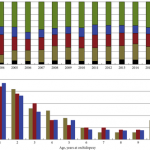Re: Use of 5α-reductase inhibitors for BPH and risk of high-grade PCa: A French population-based study
Letter to the Editor
Sir,
We read with interest the article entitled “Use of 5α-reductase inhibitors for benign prostate hypertrophy and risk of high-grade prostate cancer: A French population-based study” by Scailteux et al. [1]. We appreciate that patients should be informed about the high-grade disease that can develop in patients treated with 5-alpha reductase inhibitor for longer than 2 years.
However, we do not think that the use of the “benign prostatic hypertrophy” phrase, which has been used in nine places, is not correct when the histopathology of the disease is considered. Hypertrophy refers to an increase in cell size, while hyperplasia refers to an increase in cell number. For many years, physicians believed that this condition was caused by an increase in the size of certain cells in the prostate gland. However, studies and histopathological evaluations have shown that this is not a hypertrophy but hyperplasia with new dyes and techniques [2]. “Benign Prostate Hyperplasia” (BPH) is a histopathologically correct expression of benign prostatic enlargement that causes symptoms of lower urinary tract in men. Because the proliferation of stromal and glandular elements is involved in the histopathology of BPH.
When the references made using “hypertrophy” in the article were examined, it was seen that “hypertrophy” was not used in the studies of McConnell et al., and “hyperplasia” was used in both of the articles [3,4]. When the available literature on BPH was searched, it was observed that “hyperplasia” was used and abandonment of the term “hypertrophy” was observed.
As a result, we aimed to warn the editor not to make a clear terminology error in the British Journal of Urology International (BJUI), a respected journal in the field of urology.
Fatih Özkaya, Yılmaz Aksoy and Azam Demirel
Ataturk University Medical Faculty, Department of Urology, Erzurum, Turkey
References
- Scailteux, L.M. et al. Use of 5alpha-reductase inhibitors for benign prostate hypertrophy and risk of high-grade prostate cancer: A French population-based study. BJU Int, 2018.
- Vinay Kumar, Abul K. Abbas and Jon C. Aster Male Genital System and Lower Urinary Tract. Robbins Basic Pathology Tenth ed.,2018, p.691-712
- McConnell, J.D. et al. The effect of finasteride on the risk of acute urinary retention and the need for surgical treatment among men with benign prostatic hyperplasia. Finasteride Long-Term Efficacy and Safety Study Group. N Engl J Med, 1998. 338(9): p. 557-63.
- McConnell, J.D. et al. The long-term effect of doxazosin, finasteride, and combination therapy on the clinical progression of benign prostatic hyperplasia. N Engl J Med, 2003. 349(25): p. 2387-98.



